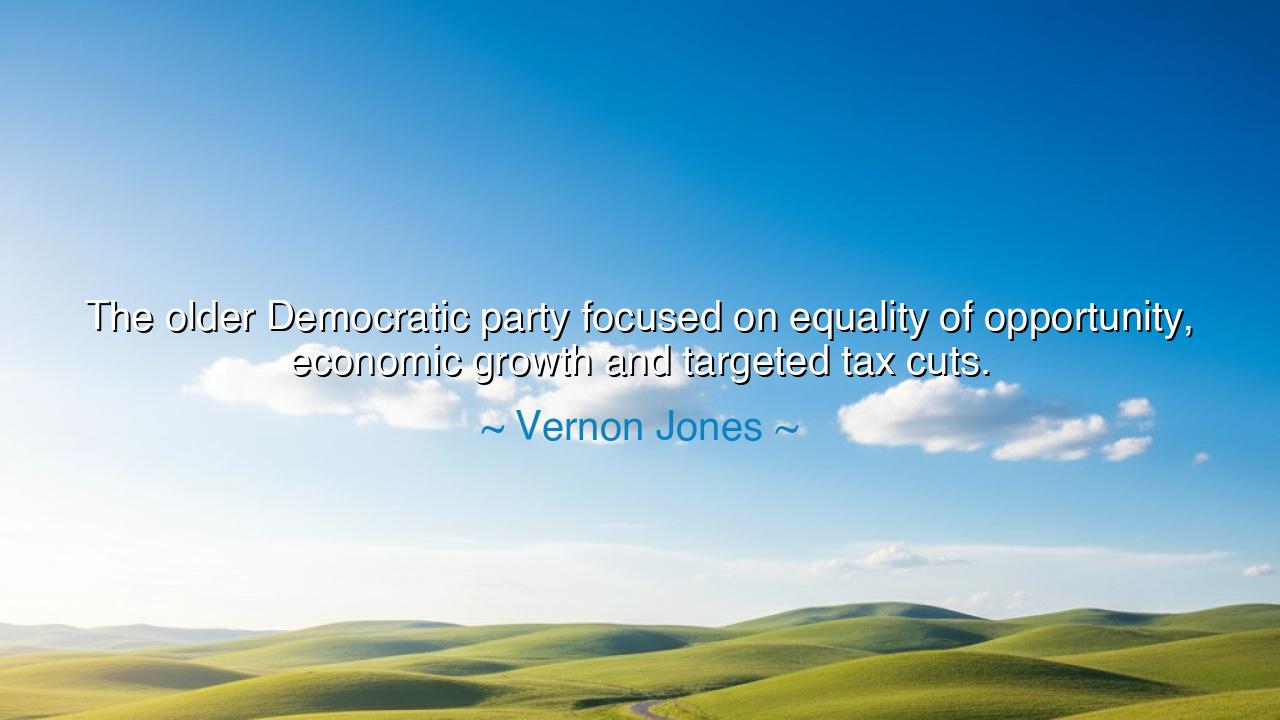
The older Democratic party focused on equality of opportunity
The older Democratic party focused on equality of opportunity, economic growth and targeted tax cuts.






In the reflective and discerning words of Vernon Jones, we hear the voice of remembrance and judgment: “The older Democratic party focused on equality of opportunity, economic growth, and targeted tax cuts.” These words are not spoken merely as a critique of politics, but as a lament for an age of balance—a time when leadership sought harmony between justice and prosperity, compassion and responsibility. Jones’s words summon us to recall a vision of governance rooted in both heart and reason, where equality was not the equal sharing of wealth, but the equal opening of doors. It is a call to remember what was noble in the past and to ask whether the spirit that once guided progress has grown dim in the present.
The origin of this quote lies in Vernon Jones’s reflections on the shifting tides of American politics. Once a Democrat and later a supporter of conservative ideals, Jones spoke from the perspective of a man who had watched his own party transform before his eyes. He referred to an “older Democratic Party”—one that, in his view, sought equality of opportunity, not sameness of outcome; that valued economic growth as the true engine of hope; and that used targeted tax cuts not to reward the wealthy, but to empower the working class and small businesses. His words recall the pragmatic idealism of mid-20th-century America, when leaders such as John F. Kennedy and Franklin D. Roosevelt dreamed of lifting all citizens by combining moral conviction with economic foresight.
In the age Jones describes, equality of opportunity was the sacred phrase of the republic. It meant that no citizen, however humble in birth, would be denied the chance to rise through effort and education. It was not a promise of equal results, but of fair beginnings—a vision that believed in both the dignity of labor and the divinity of freedom. In this creed, prosperity was not a sin but a shared inheritance, and the role of government was to clear the path, not to carry the traveler. The leaders of that time spoke of the nation as a ladder, not a cradle; they believed that society advanced when the individual was free to climb as high as his courage could take him.
Consider the story of President John F. Kennedy, who once declared, “A rising tide lifts all boats.” His vision of economic growth was not a blind faith in markets, but a recognition that when a nation invests in innovation, education, and enterprise, it uplifts even the poorest among its people. Kennedy championed tax cuts not for greed, but to unleash the energy of the working American—the farmer, the builder, the teacher, and the dreamer. This spirit of growth, tempered by compassion, reflected the balance Jones speaks of: a time when prosperity and equality were not rivals, but companions in the pursuit of freedom.
Yet, Jones’s words also carry a tone of sorrow, for he speaks as one who fears that such balance has been lost. In his view, the modern age of politics has become consumed by division—one side worshipping wealth without mercy, the other preaching equality without wisdom. He warns that when equality becomes envy and growth becomes greed, the harmony of the republic is broken. The old Democratic spirit, he suggests, did not demand that all should have the same, but that all should have a fair chance to strive. It believed that opportunity, not entitlement, was the soil in which greatness grew.
The heart of Jones’s wisdom lies in his understanding of human nature. He knew that people do not flourish under endless dependence, nor do nations thrive when prosperity is hoarded by the few. The “older” vision of democracy sought to balance freedom with fairness, ambition with compassion. It called upon the strong to remember the weak, and upon the weak to rise through effort and education. In this equilibrium, the soul of a nation finds peace. The equality of opportunity he defends is not merely economic—it is moral. It is the belief that every child, no matter their station, carries the spark of greatness if given the tools to kindle it.
So let this teaching be carried into the hearts of all who seek wisdom in the governance of nations: prosperity without justice is hollow, and equality without freedom is tyranny. The lesson of Vernon Jones’s words is not to return blindly to the past, but to reclaim its spirit—to remember that the truest measure of democracy lies in both the fairness of its laws and the vigor of its people. Let leaders strive for policies that lift rather than divide; let citizens work with integrity, demanding not handouts, but hands held in partnership.
And thus, in the voice of Vernon Jones, we hear a reminder that the strength of a nation lies not in its politics, but in its principles. Equality of opportunity, economic growth, and moral balance—these are the pillars upon which civilizations endure. When each generation remembers this harmony, freedom thrives; when it forgets, division reigns. Let every citizen, then, be both dreamer and builder, creating a society where justice and prosperity walk side by side, and where the promise of opportunity shines like the dawn for all who dare to reach toward it.






AAdministratorAdministrator
Welcome, honored guests. Please leave a comment, we will respond soon